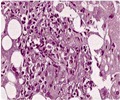
These findings, published in PLoS Medicine, are important given international efforts to increase the coverage of artemisinin-based combination therapy (ACT) in public health sectors and the mounting concern that the continued indiscriminate presumptive use of ACT for treating all childhood fevers may lead to resistance to one of the main drug classes currently effective in the treatment of falciparum malaria.
The authors were able to quantify the number of children with fevers who do and do not have malaria by gathering data on paediatric fever prevalence, treatment-seeking rates, and childhood populations and combining this information with a geographical information system model. The authors then assembled data to estimate plausible ranges for the proportion of paediatric fevers seen at clinics positive for P. falciparum in different malaria endemic areas.
This study provides a useful map of the prevalence of malarial and non-malarial childhood fevers across sub-Saharan Africa and an indication of how many of the children with fever reaching public clinics are likely to have malaria and might therefore benefit from ACT. Furthermore, these findings also highlight the potential benefits of introducing rapid diagnostic testing for malaria and can now be used to quantify the resources needed for and the potential clinical benefits of different policies for the introduction of rapid diagnostic testing for malaria across Africa.
Source-Eurekalert













